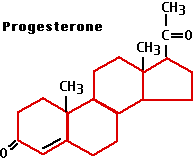| Index to this page |

Progesterone is one of the steroid hormones.
It is secreted by the corpus luteum and by the placenta and is responsible for preparing the body for pregnancy and, if pregnancy occurs, maintaining it until birth.
If pregnancy does occur, the placenta begins to secrete progesterone which supplements that of the corpus luteum. In fact, by the fifth month of pregnancy, the placenta secretes sufficient progesterone by itself that the corpus luteum is no longer essential to maintain pregnancy.
The progesterone response element is a specific sequence of DNA in the promoters of certain genes that is needed to turn those genes on (or off). Thus, the complex of progesterone with its receptor forms a transcription factor.
| Some target cells also have other progesterone receptors that are exposed at the surface of the cell embedded in the plasma membrane. Binding of the hormone to them produces more rapid effects than those of the nuclear receptors. Link to an example. |
Mifepristone (also known as RU486) is a synthetic steroid related to progesterone.
Unlike the progestins discussed above, that mimic the action of progesterone, mifepristone blocks the action of progesterone.
(Synthetic molecules that mimic the action of a natural molecule are called agonists; those that oppose it are antagonists.)
Mifepristone is a progesterone antagonist. It binds to the progesterone receptor, and in so doing prevents progesterone itself from occupying its receptor. Thus the gene transcription normally turned on by progesterone is blocked, and the proteins necessary to begin and maintain pregnancy are not synthesized.
If mifepristone is taken shortly after intercourse, it prevents pregnancy. If taken early in pregnancy, it causes the embryo to be aborted.
| Welcome&Next Search |